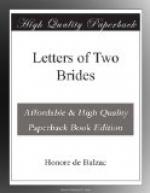What has passed within this enigmatic being? He is no longer the same man. He came, dressed quite simply, but just as any gentleman would for a morning walk. He put forth all his eloquence, and flashed wit, like rays from a beacon, all through the lesson. Like a man roused from lethargy, he revealed to me a new world of thoughts. He told me the story of some poor devil of a valet who gave up his life for a single glance from a queen of Spain.
“What could he do but die?” I exclaimed.
This delighted him, and he looked at me in a way which was truly alarming.
In the evening I went to a ball at the Duchesse de Lenoncourt’s. The Prince de Talleyrand happened to be there; and I got M. de Vandenesse, a charming young man, to ask him whether, among the guests at his country-place in 1809, he remembered any one of the name of Henarez. Vandenesse reported the Prince’s reply, word for word, as follows:
“Henarez is the Moorish name of the Soria family, who are, they say, descendants of the Abencerrages, converted to Christianity. The old Duke and his two sons were with the King. The eldest, the present Duke de Soria, has just had all his property, titles, and dignities confiscated by King Ferdinand, who in this way avenges a long-standing feud. The Duke made a huge mistake in consenting to form a constitutional ministry with Valdez. Happily, he escaped from Cadiz before the arrival of the Duc d’Angouleme, who, with the best will in the world, could not have saved him from the King’s wrath.”
This information gave me much food for reflection. I cannot describe to you the suspense in which I passed the time till my next lesson, which took place this morning.
During the first quarter of an hour I examined him closely, debating inwardly whether he were duke or commoner, without being able to come to any conclusion. He seemed to read my fancies as they arose and to take pleasure in thwarting them. At last I could endure it no longer. Putting down my book suddenly, I broke off the translation I was making of it aloud, and said to him in Spanish:
“You are deceiving us. You are no poor middle-class Liberal. You are the Duke de Soria!”
“Mademoiselle,” he replied, with a gesture of sorrow, “unhappily, I am not the Duc de Soria.”
I felt all the despair with which he uttered the word “unhappily.” Ah! my dear, never should I have conceived it possible to throw so much meaning and passion into a single word. His eyes had dropped, and he dared no longer look at me.
“M. de Talleyrand,” I said, “in whose house you spent your years of exile, declares that any one bearing the name of Henarez must either be the late Duc de Soria or a lacquey.”
He looked at me with eyes like two black burning coals, at once blazing and ashamed. The man might have been in the torture-chamber. All he said was:
“My father was in truth the servant of the King of Spain.”




